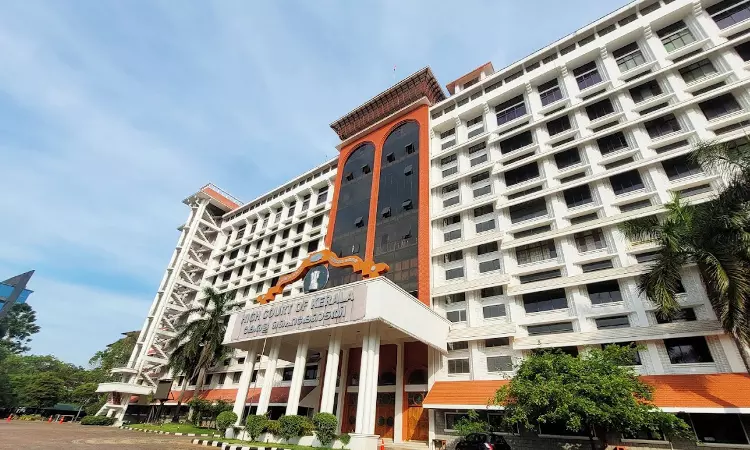- Home
- /
- High Courts
- /
- Kerala High Court
- /
- Kerala High Court Directs Cochin...
Kerala High Court Directs Cochin Devaswom Board's Vigilance Wing To Monitor Fake Websites Duping Devotees Through Online Donations, Pooja Booking
Rizmi Lia
13 Jun 2025 5:22 PM IST
In a significant order aimed at protecting devotees from online fraud, the Kerala High Court's has directed the Chief Vigilance Officer of the Cochin Devaswom Board to maintain constant vigilance over fake digital platforms that impersonate temple services and exploit the public.The writ petition was filed by devotees of Sree Poornathrayeesa Temple, Tripunithura, raising serious concerns...
In a significant order aimed at protecting devotees from online fraud, the Kerala High Court's has directed the Chief Vigilance Officer of the Cochin Devaswom Board to maintain constant vigilance over fake digital platforms that impersonate temple services and exploit the public.
The writ petition was filed by devotees of Sree Poornathrayeesa Temple, Tripunithura, raising serious concerns about fake Instagram and other social media accounts operating in the name of the temple. Initially, the petitioners sought a wide array of reliefs, including financial audits, regulation of volunteers, and transparency in temple offerings and contracts. However, during the course of the hearing, they chose to narrow the scope of their plea, focusing solely on the issue of fake social media accounts and online exploitation while reserving the right to raise other issues through a separate petition.
A division bench of Justice Anil K. Narendran and Justice P.V. Balakrishnan in its order said:
"The Vigilance Wing of the Cochin Devaswom Board, headed by the additional 14th respondent Chief Vigilance Officer, shall have a constant vigil against exploitation of the devotees with regard to online pooja booking, online donations, etc., through fake websites, Instagram accounts, etc., in the name of the respective temples. Persons behind such fake websites, Instagram accounts, etc., shall be proceeded against, in accordance with law, by submitting proper complaints before the Station House Officer of the concerned Police Station. The 1st respondent Board shall take necessary steps to provide online pooja booking, online donations, etc., in respect of all major temples under its management, if not already provided, for the convenience of the devotees".
Recognising the risk of cyber fraud in spiritual spaces, the High Court directed that the official website and Instagram account details of all temples under the Cochin Devaswom Board must be prominently displayed within the temple premises.
It noted that the Cochin Devaswom Board had already issued an order authorising its Chief Vigilance Officer to inquire into a fake Instagram account titled “Sree Poornathrayeesa Kshethram”. This internal vigilance action was based on a report submitted by the Assistant Commissioner, Tripunithura Group, dated 27.09.2024.
In its submission before the Court, the Board confirmed that the account is now under the control of the official Devaswom Officer. It was further submitted that several major temples, including Sree Poornathrayeesa Temple, Chottanikkara Bhagavathy Temple, Sree Vadakkunnathan Temple, and Ernakulam Siva Temple, offer authenticated online pooja booking and donation facilities on their respective official websites.
Importantly, the Court also ruled that Temple Advisory Committees or their members shall not be permitted to collect money from devotees through unofficial websites, social media handles, or any other online platforms.
This direction, the Court held, is rooted in the settled legal principle that any amount collected in the name of a temple is an offering to the deity, who is treated in law as a perpetual minor. The purpose of such collections is exclusively for the benefit of the deity. Accordingly, any funds collected by Temple Advisory Committees in connection with festivals, repairs, or construction must be temporarily credited to the Devaswom fund, under the formal control of the Board.
To combat impersonation, the Chief Vigilance Officer is mandated to monitor online pooja booking and donation systems on an ongoing basis. Where fake websites or social media accounts are found, the responsible persons must be proceeded against in accordance with law, including by filing proper complaints before the local police.
In support of its reasoning, the Court cited its earlier judgment in Travancore Devaswom Board v. Mohanan Nair [2013 (3) KLT 132], which followed the Supreme Court's dictum in A.A. Gopalakrishnan v. Cochin Devaswom Board [(2007) 7 SCC 482]. The Apex Court emphasised that it is the duty of the courts to protect and safeguard the interest and properties of the religious and charitable institutions. The High Court therefore, is the guardian of the Deity and apart from the jurisdiction under Section 103 of the Land Reforms Act, 1957 viz. the powers of revision, the High Court is having inherent jurisdiction and the doctrine of parens patriae will also apply in exercising the jurisdiction.
Further, the High Court instructed the Cochin Devaswom Board to conclude the ongoing inquiry after giving a fair hearing to: The first petitioner (as a representative), Former Temple Advisory Committee members,And others named in the Chief Vigilance Officer's report. This process must be completed within three months from the date of receipt of the judgment.
Additionally, the Court directed that if not already implemented, the Board must ensure that all major temples under its jurisdiction provide online pooja booking and donation facilities, to enable transparency and ease of access for devotees.
Finally, citing its role under the doctrine of parens patriae, which empowers the state to act as a guardian for individuals or entities unable to protect themselves, the Court reaffirmed its inherent jurisdiction to protect temple properties and devotee rights.
Case Title: Devidas C. & Others v. Cochin Devaswom Board & Others
Citation: 2025 LiveLaw (Ker) 335
Case Number: W.P.(C) No. 35495 of 2024
Counsel for the Petitioners:Advocates.T. Sanjay, Sanil Kumar G., Ardhra Krishna, Sreekanth G Menon
Counsel for the Respondents: Advs. K.P. Sudheer, Dinesh R. Shenoy, Suvin R. Menon, Joy Thattil Ittoop, Bijish B. Tom, Jacob Tomlin Varghese, Baby Sonia, Uthara A.S., Nevis Cassandra L. Caxton Loretta, Krishna Kumar T.K., Karun Mahesh, K.S. Arun Kumar
Click Here To Read/ Download Order



